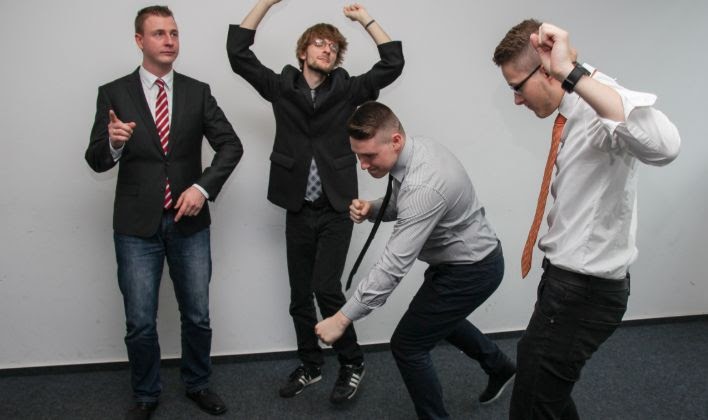Chief Happiness Officer: what a cool name you have, but… what are you really meant for? In this article, we are going to reflect on this new trend in terms of job title in the company, which goes far beyond the traditional and is often judged as the gray area in charge of HR.
Chief Happiness Officer
Bringing light-hearted humor into everyday office life, magically encouraging laughter to make our tummies ache. Bringing delicious muffins that would make our cardiologist tremble but that, paradoxically, make our hearts happy. Knowing how to listen, solve, redirect and understand where others find it difficult to listen to us, to solve our lives, to redirect our crises, and to understand our anxieties?
Aren’t these, and so many others, indisputable virtues in a work team? Wouldn’t we value them in any boss, manager or colleague in our company? And, more importantly for the organization, how would it change the life of the entire workforce if we structured this role if we institutionalized it to give it more power and therefore increase the happiness of all departments?
Chief Happiness Officer: beyond the typical HR
Some of this is the basis for the presence, in some companies, of a figure that has emerged from the field of HR but has recently passed through a glittering workshop: we are talking about the Chief Happiness Officer.
If we don’t think about it too much, it is hard to oppose the existence of such a position in our corporate structure. Full belly, happy heart, wasn’t it, literally and metaphorically? And we all know: if our hearts are happy and full of joy, we are much more likely to produce more and better, at a lower psychological cost and with greater benefit for all parties involved than if we have a chard face.
Join the global leading solution in mental well-being
Chief Happiness Officer, please pray for us
We are all waiting for them to show up at the door and brighten up our lives, to lift our bad moods, to give us the happiness we can’t find outside these four walls. What the hell, to put us into orbit thanks to their talent and know-how with people. Let’s hope that our company decides to give itself a chance and reward us all with this professional profile?
Happiness!
However, let’s make an effort for a moment not to be dazzled by the sense of humor (and let’s not miss it!), the cupcakes (two by two!), and the alleged and so-called soft skills (which are social skills and emotional or interpersonal intelligence of a lifetime).
Let’s think: does it really make sense to have a figure called Chief Happiness Officer? Is it conceptually justified?
We know that companies have a huge responsibility to protect our physical and psychological well-being and those that do not care about the prevention of psychosocial risks in their employees. However, is it possible to be happy in the company? Should the company be responsible for our happiness? Can a person take upon themselves the task of facilitating the happiness of their colleagues?
More psychological well-being and less happiness
There may be more than one person in the HR department who is going overboard with their wishlist. It might be a good idea to lower the expectations we place on ourselves (and others) regarding our happiness and the role of our work in it, and talk more about psychological well-being, mental health, or just plain health, which is also good for us.
Let them call you bold (bold!) but it is about finding a margin of action with workers that has more real operational possibilities and less poetry that cannot be put into practice. A space that, as psychologists, allows us to teach our colleagues that one thing is fun and pleasure (wonderful and useful things, also at work), another is psychological well-being (in the broad sense of the word) and a third is that jumble that everyone calls happiness.
After all, when it comes to taking care of people and analyzing what happens to them in order to make decisions about their well-being, it is very important to avoid the traps of colloquial language. This will help us not to confuse the goal of making employees satisfied (something rustic, but unavoidable) with the goal of making employees happy (beautiful, but outside the company’s scope of action).
In short, do we need a Chief Happiness Officer in our office? Yes, but no. We need a profile in charge of taking care, at a serious, realistic, and technically operative level, of the psychological well-being and mental health of the people who are part of the company. If that makes us happy in the end, let’s raise our glasses. However, it seems more feasible to leave happiness to the people and save for the company what concerns real psychological health. Even if the name shines less brightly and makes us less amused.
It is better this way than to discover when removing the wrapping paper, that the box is practically empty.
Caring for employees’ psychological well-being
Ifeel has created an emotional well-being program for companies, designed by its team of expert psychologists with one main objective: to help companies place employee health at the top of their strategic pyramid when it comes to boosting productivity.
Thanks to this partnership, the people in charge of HR departments can receive personalized, data-driven advice on how to properly manage the different types of needs of their team members, whether they ask for it or not, and be more efficient in boosting their psychological well-being.
On the other hand, this program offers employees a holistic mental health care service structured at different levels according to their needs. This service includes, if required, online psychological therapy with a psychologist specialized in cases like theirs. Try our program now so you can see how it could help you.
We hope you found this post about the Chief Happiness Officer interesting. If you would like more information about our emotional well-being program for companies, just request it and we will contact your team as soon as possible.
Don’t miss this article about the advantages of using ifeel’s mental health at work platform.
What does a Chief Happiness Officer do?
A Chief Happiness Officer is responsible for creating and implementing strategies to improve employee well-being, engagement, and overall happiness within an organization, focusing on creating a positive work culture and environment.
Is Chief Happiness Officer a common role in companies?
While the role of Chief Happiness Officer is not as common as other executive positions, it has gained popularity in recent years as organizations recognize the importance of employee satisfaction and its impact on productivity and retention.
How does a Chief Happiness Officer measure employee happiness?
A Chief Happiness Officer may use various methods to measure employee happiness, such as regular surveys, feedback sessions, and analyzing key performance indicators related to employee well-being and job satisfaction.
What qualifications or background is required to become a Chief Happiness Officer?
Qualifications for a Chief Happiness Officer vary depending on the organization but typically include a strong background in human resources, organizational psychology, or a related field, as well as experience in employee engagement and culture development.









